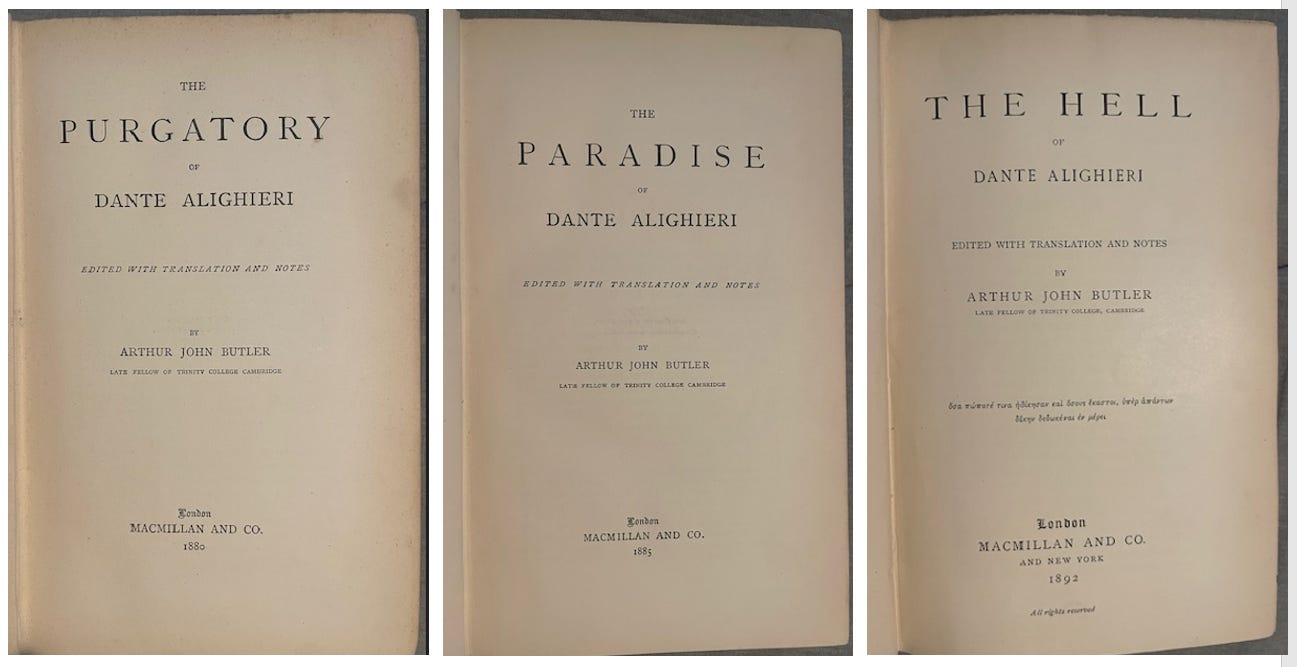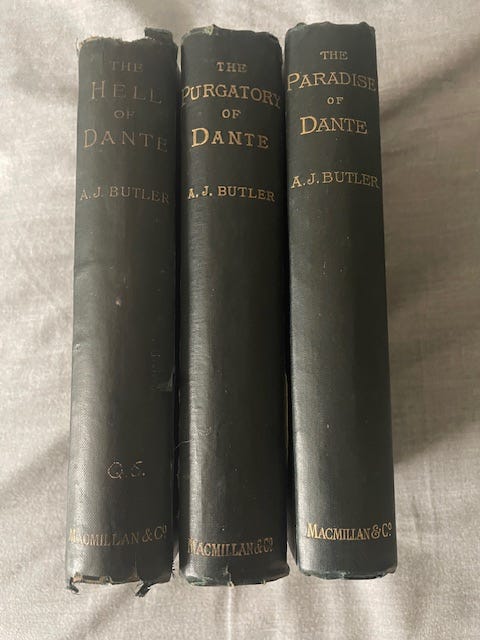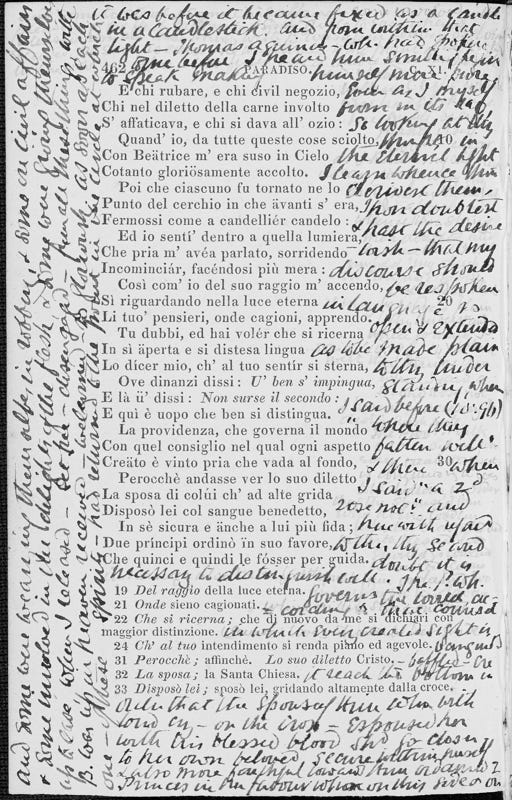Unlike the 1870s, the 1880s were packed with translations. There were four Divine Comedys, plus two Divine Comedys started during this decade, but not completed until the 1890s, two Infernos, a Purgatorio, an unpublished Paradiso. On top of that, there were many partial translations, which, of course, will be covered in a future post. Because of this unwieldy number of translations and being prone to verbosity, I will break this decade into multiple posts. Here is the full list:
1880 - Arthur John Butler - Purgatorio*
c.1880 - James Macgregor - Paradiso - Unpublished Manuscript*
1881 - Warburton Pike - Inferno
1883 - William Stratford Dugdale - Purgatorio*
1884 - James Romanes Sibbald - Inferno*
1885 - Arthur John Butler - Paradiso*
1885 - James Innes Minchin - Divine Comedy*
1886 - Edward Hayes Plumptre - Inferno & Purgatorio*
1887 - Frederick Kneeller Haselfoot Haselfoot - Divine Comedy*
1887 - Edward Hayes Plumptre - Paradiso*
1888 - John Augustine Wilstach - Divine Comedy
1889 - William Warren Vernon - Purgatorio*
Translations in my collection are marked with an asterisk. All pictures are from my collection (unless noted). All titles are linked to PDF’s where available. I have a scan of the Macgregor, not the original.
1880 & 1885 - Arthur John Butler - Purgatorio & Paradiso
First in 1880 then in 1885 Arthur John Butler published his prose translations of Purgatorio and Paradiso respectively. He is one of the few translators who published the Divine Comedy over multiple years and did not start with the Inferno. To note, Butler’s Inferno was not issued until the following decade, 1892. Interestingly, and again deviating from the norm, Butler uses the English equivalents in the titles, Purgatory, Paradise, and Hell. I will still refer to them in the Italian throughout due to my nearly unbreakable habit of doing so for far too many years. Here are the links: The Purgatory of Dante Alighieri,1 1880, The Paradise of Dante Alighieri,2 1885, and for consistency I’ll add the first volume, yet the last issued (and will be discussed in the following decade), The Hell of Dante Alighieri, 3 1892.
Butler was the first translator to publish the Divine Comedy out of traditional order by starting with Purgatorio. It would seem odd to begin in media res, but there was a specific reason behind this. In 1849 John Aitken Carlyle published the first literal prose translation of the Inferno. Butler wanted to “continue” Carlyle’s translation and even contacted him for his consent. His aim was for the translation to be “cast in literal prose of set purpose, to continue Carlyle's work. Dr. Carlyle's consent having been asked and accorded.”4 He continued this idea with Paradiso five years later. Finally, twelve years after his publication of Purgatorio, he issued his Inferno. I mean, at some point, after doing something most of the way, you might as well just finish it, and he did.
Even though Butler’s published work is in prose, he did experiment with translating in poetic form. In the Memoir of Arthur John Butler, 1917, there is a blank verse excerpt of Purgatorio, Canto 27, lines 94-109 that was found among undated papers.5 It would be interesting to know chronologically where this sits in the span of years he spent translating.
Tangent Realized
I originally began this project as a resource for collectors of Dante, but that seems to have been sidetracked, albeit, I believe, in a good way. Starting here, and in all future posts, the few last paragraphs of each listed translation will be geared towards book nerds like myself. You can skip to the next translation heading if this isn’t your thing, though the provenance discussions can sometimes be quite exciting! I will be (slowly) going back to previous posts and righting this egregious error.
The Specifics
NOTE: I primarily collect first editions and all information listed is gleaned from the first edition copies in my collection (unless otherwise noted).
Butler’s Divine Comedy is in three volumes. The set I have is black or a really, really dark green cloth (I can’t tell) with gold lettering on the spine. I bought these books separately over time and they were luckily all the same color. I figured the publisher kept it consistent over the twelve years they were released to make it possible for a cohesive set to be built with separate purchases. Then I saw a complete set online that was clearly blue. I just had to buy them, not sure they will arrive before I post (they didn’t). I guess I got lucky with matching my separate puchases.
The page size for all three volumes is 7 3/4 inches by 4 5/8 inches. Below is a breakdown of individual stats and includes some interesting provenance. I am still unclear on the “official” way to list the pages, but hopefully this make sense:
Purgatorio: The Purgatory of Dante Alighieri. Macmillan and Co., London, 1880.
<i-xviii> starting verso: half-title page (i), Macmillan seal (ii), title page (iii), printer (iv), preface (v-xiii), contents (xiv-xv), preliminary note (xvi), and errata (xvii-xviii); pp. 1-458; 1 page advertisements (verso and recto).
Printer listed on p. iv and p. 458: Charles Dickens and Evans, Crystal Palace Press.
Provenance: My copy of Purgatory has three different owners’ names written inside. “E Libris William H. Hutton, Coll. D. Joh. Bapt. Oxon. Apr. 1884,” “D. R. Gibling, 31 Jan ‘46,” and “Ex Libris Steven Oppenheimer M.A.” I could not find anything concrete on D. R. Gibling and Steven Oppenheimer turned out to be a way too popular name to narrow down, but William H. Hutton? Oh, yes (rubbing hands together).
One of the many things I love about collecting books is the provenance. Sometimes it’s nothing, but other times, it’s beyond fascinating! Here is a prime example. In my copy of this book, on page i, handwritten in the top right corner, is “E Libris William H. Hutton, Coll. S. Joh. Bapt. Oxon. Apr. 1884.” Of course, I googled it!
This book belonged to the Very Reverend William H. Hutton. I learned “Very Reverend” is a real thing. I had no clue. It is an honorific given to members of the clergy under special circumstances, like becoming a Dean. Here’s a very brief list of his accomplishments: He was a Fellow of St. John Batist College from 1884 to 1923, a Chaplain of the Order of St John of Jerusalem (one of the Orders of Chivalry, you know, knights!), and Dean of Winchester Cathedral from 1919 till his death in 1930.6 Also, he published many, many, many books, I stopped counting after 20.
Of course, when I saw “Dean of Winchester Cathedral” in my head I started playing the song Winchester Cathedral by The New Vaudeville Band. It was one of the first 45’s I ever owned. Don’t judge. I also had Crimson and Clover, and that makes me cool. Actually, I still have that one.
Paradiso: The Paradise of Dante Alighieri. Macmillan and Co., London, 1885.
<i-xvi> starting verso: half-title page (i), Macmillan logo (ii), title page (iii), printer (iv), preface (v-xi), contents (xii-xiii), preliminary note (xiv) additions and corrections (xv); pp. 1-436.
Printer listed on p. iv and p. 436: Charles Dickens and Evans, Crystal Palace Press.
Provenance: Not known.
Inferno: The Hell of Dante Alighieri. Macmillan and Co., London and New York, 1892.
<i-xvi> starting verso: half-title page (i), Macmillan logo (ii), title page (iii), blank page (iv), preface (v-xiii), contents (xiv-xv), and preliminary note (xvi); pp. 1-435, p. 436 blank page(recto); additional pp. 1-44 in the form of an advertisement, A Classified Catalogue of Books, pp. 1-40, and an index, pp. 40-44.
Printer listed on p. 435: R & R Clark, Edinburgh.
Provenance: My copy of Hell is an ex-library book from the Temple Reading Room at the Rugby School in Warwickshire, England. You can see it got a a bit roughed up in the scrum (attempt at a rugby joke).
c. 1880 - James Macgregor - Paradiso
In the Bodleian Library at Oxford, there is a prose translation of Paradiso7 written in the margins of an 1827 Italian edition of the Divine Comedy. It was given to the library by the Dante scholar Paget Toynbee. Toynbee’s importance to Dante scholarship, pertaining specifically to translations, cannot be understated. I have a future post dedicated to him.
Often, I see the name of the translator and I am clueless to who they were, then after a bit of research, I get a glimpse of some fascinating life tidbits. Don’t get me wrong, you have to dig through a lot of boring every day stuff, but I always find something that piques my interest. MacGregor was no different.
He was born at Scone, Perthshire, Scotland in 1832 and at 16 began studying for the ministry of the Church of Scotland at St. Andrews University graduating in 1855.8 This same university, in 1870, awarded him the honorary degree of D.D.9 Two intersting things for me. First, I had no clue the Church of Scotland was its own thing. I thought it was just a part of the Church of England (sorry, no offense meant). Second, I knew D. D. stands for Doctor of Divinity, but I did not know it was an honorary title. Look at me learning stuff.
His popularity, success, and strength as a clergyman seems to be tied to his oratory skills, “MacGregor is a born orator. You have to listen with rapt attention to every word he says. He is equally great, too … in pulpit and on platform.”10 There was a whole list of fancy, yet boring, sounding titles that were attributed to him over his lifetime, but a few caught me.
As an American that has a fascination with British Royalty I found that in 1886 he became Chaplain-in-Ordinary to Queen Victoria, the appointment was renewed by Edward VII in 1901, and then by George V in 1910.11 A Chaplain-in-Ordinary is one of the 36 honorary chaplains to the Queen/King of England.12 Yet another thing learned.
Another fancy sounding title MacGregor had was moderator of the General Assembly of the Church of Scotland which he held in 1891.13 Apparently, this is a big deal. For the one year the title is held they are the spokesperson and public face of the Church. Some of their more interesting duties include chairing the annual General Assembly and the supreme court of the Church.14
Finally, and I think this is really cool. He went on a trip to Canada to inspect the progress of the Canadian Pacific Railway with the Governor-General of Canada, Marquis of Lorne (Sir John Douglas Sutherland Campbell). From that trip there is now a town named after him, MacGregor15, in Manitoba.
Sidenote: Marquis is French. MacGregor is not, so shouldn’t it be Marquess? Just a thought…
Transcription
Here is a scan from MacGregor’s prose translation. This is Paradiso, lines 6-36. I randomly chose this page to transcribe, which you will find below.
I literally spent HOURS trying to decipher this, and there are still quite a few gaps that need fixing. Feel free to take a shot at it. I divided the translation into tercets to help me get a better understanding of what MacGregor wrote and used Longfellow as a reference since it was within a similar time period. I tried to keep his punctuation and capitalization. This prose translation seems to have been done strictly for MacGregor’s own benefit.
Three question marks (???) means I don’t know the word. A word followed by a single question mark (with?) means I think that is the word, though in some incidents I am less confident than others. Brackets [bracket] follow abbreviations and I am fairly certain about these. Words divided by a slash means it could be one word or the other.
Any corrections/suggestions are greatly encouraged! I can really use some help.
(Left side)
And some were weaning themselves in robbery, and some in civil affairs
and some involved in the delights of the flesh,
and some were giving themselves up to ease, 9
when I released - set free - disengaged - from all these things,
with? B. [Beatrice] was up in heaven
received - welcomed - to flourish. 12
as soon as each one - of these spirits - had returned to the point
in the circle at which (Top of Page) it was before
it became fixed as a candle in a candlestick. 15
and from within that Light - Thomas Aquinas -
wh.[which] had spoken to me before I heard
him smiling w/in?[within] himself more? pure, 18
Even as I myself from in its ???(ray?),
So looking at thy thought? in the Eternal Light
I learn whence ??? derivest* them, 21
Thou doubtest and hast the desire - wish - that my discourse
should be respoken in language so open and extended
as to be made plain to thy understanding, 24
when/where I said before (10:96)** “where they fatten well”
and there/then when I said “a 2d[second] rose not”
and here with ??? within? thy second doubt it is necessary to distinguish well. 27
The P. [Providence] wh. [which] governs the world
according to that counsel in which every created sight
is vanquished - baffled - ere it reach the bottom 30
in order that the spouse of Him
who with loud cry - on the cross? -
Espoused her with his blessed blood 33
shd [should] go closer to her own beloved, secure within herself and also more faithful
??? ??? ordained 2 Princes in the/her ???
where on this give and on (bottom next page) that shd [should] be to her for guide. 36
* derivest - (archaic) second-person singular simple present form of derive. https://www.wordhippo.com/what-is/the-verb-for/derivative.html
** Might this refer to Psalm 96:10? Someone help me out here please.
Thank you for reading. If you haven’t yet…
Butler, Arthur John. The Purgatory of Dante Alighieri. London, Macmillan and Co.,1880.
Butler, Arthur John. The Paradiso of Dante Alighieri. London, Macmillan and Co.,1885.
Butler, Arthur John. The Hell of Dante Alighieri. London, Macmillan and Co.,1892.
Quiller-Couch, Arthur Thomas, Sir. Memoir of Arthur John Butler. London, John Murray, 1917, p. 102.
Ibid, 103.
Who Was Who: 1929-1940. Vol. III, London, Adam & Charles Black, 1991, p. 687.
Unpublished Manuscript. This translation is written in the margins of an 1827 publication of an Italian Divina Commedia. Bodleian Library, Oxford, Toynbee 984.
Lee, Sidney, editor. Dictionary of National Biography, Second Supplement, Vol. II. London, Smith, Elder & Co., 1912, p. 520.
“Macgregor, James, 1832-1910.” Archival Collections Catalogue. McGill University, McLennan Library. https://archivalcollections.library.mcgill.ca/index.php/macgregor-james-2. 17 July 2025.
Lee, Sidney, editor. Dictionary of National Biography, Second Supplement, Vol. II. London, Smith, Elder & Co., 1912, p. 521.
Ibid.
“Chaplain in ordinary.” Merriam-Webster.com Dictionary, Merriam-Webster, https://www.merriam-webster.com/dictionary/chaplain%20in%20ordinary. Accessed 18 Jul. 2025.
Lee, Sidney, editor. Dictionary of National Biography, Second Supplement, Vol. II. London, Smith, Elder & Co., 1912, p. 521.
“The Moderator.” The Church of Scotland. https://www.churchofscotland.org.uk/about-us/general-assembly/moderator. 20 July 2025
“Macgregor, James, 1832-1910.” Archival Collections Catalogue. McGill University, McLennan Library. https://archivalcollections.library.mcgill.ca/index.php/macgregor-james-2. 16 July 2025.







Thanks Russ
Lovely, lovely work.